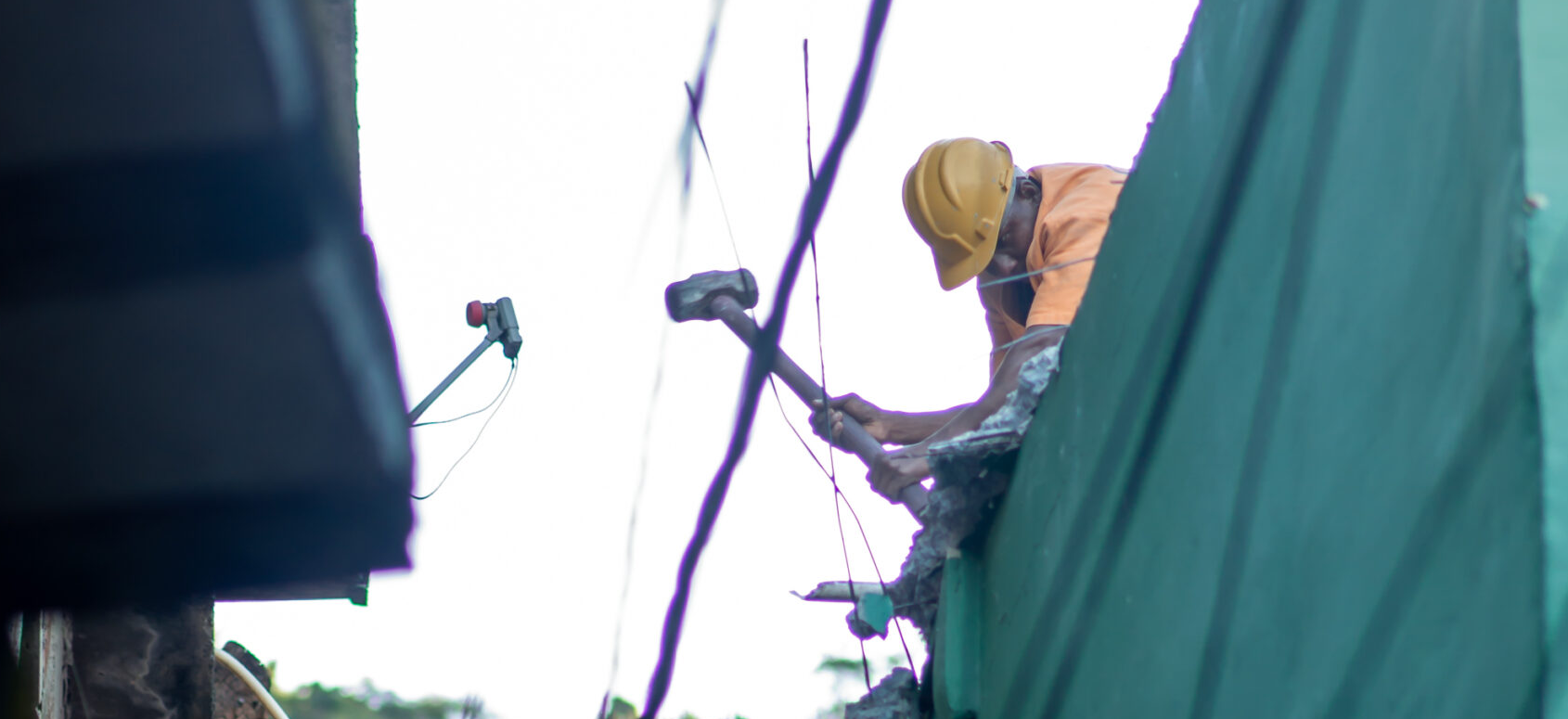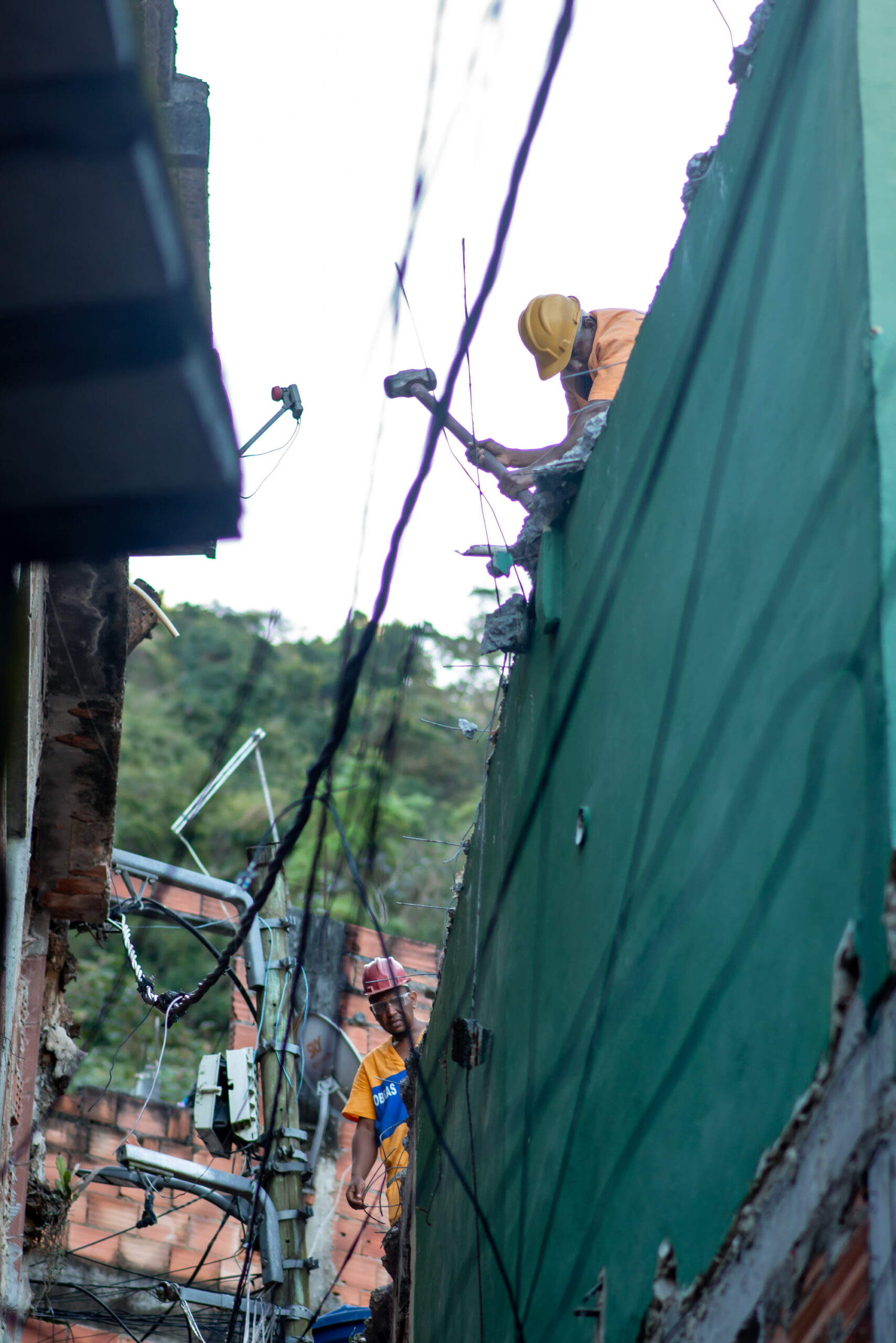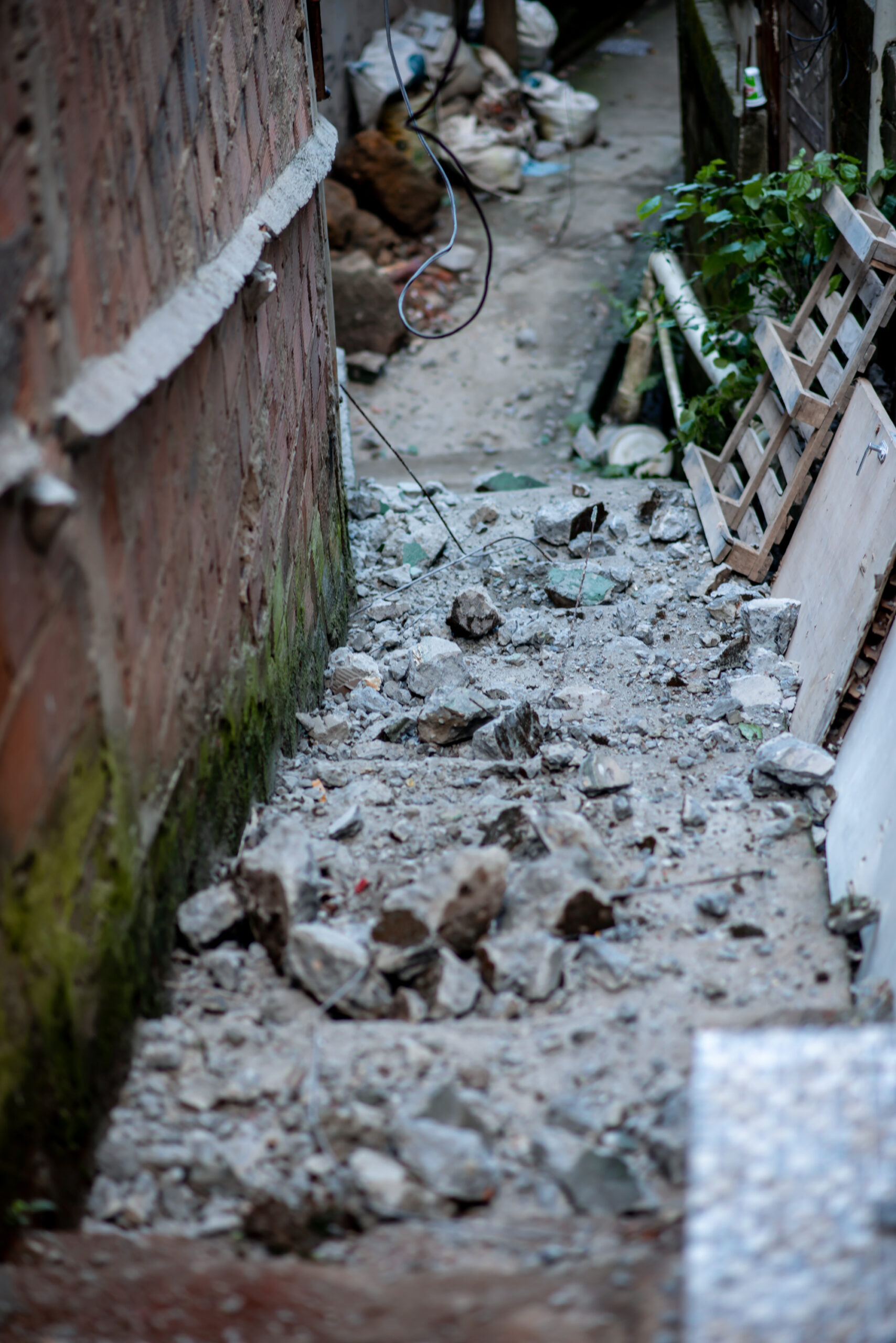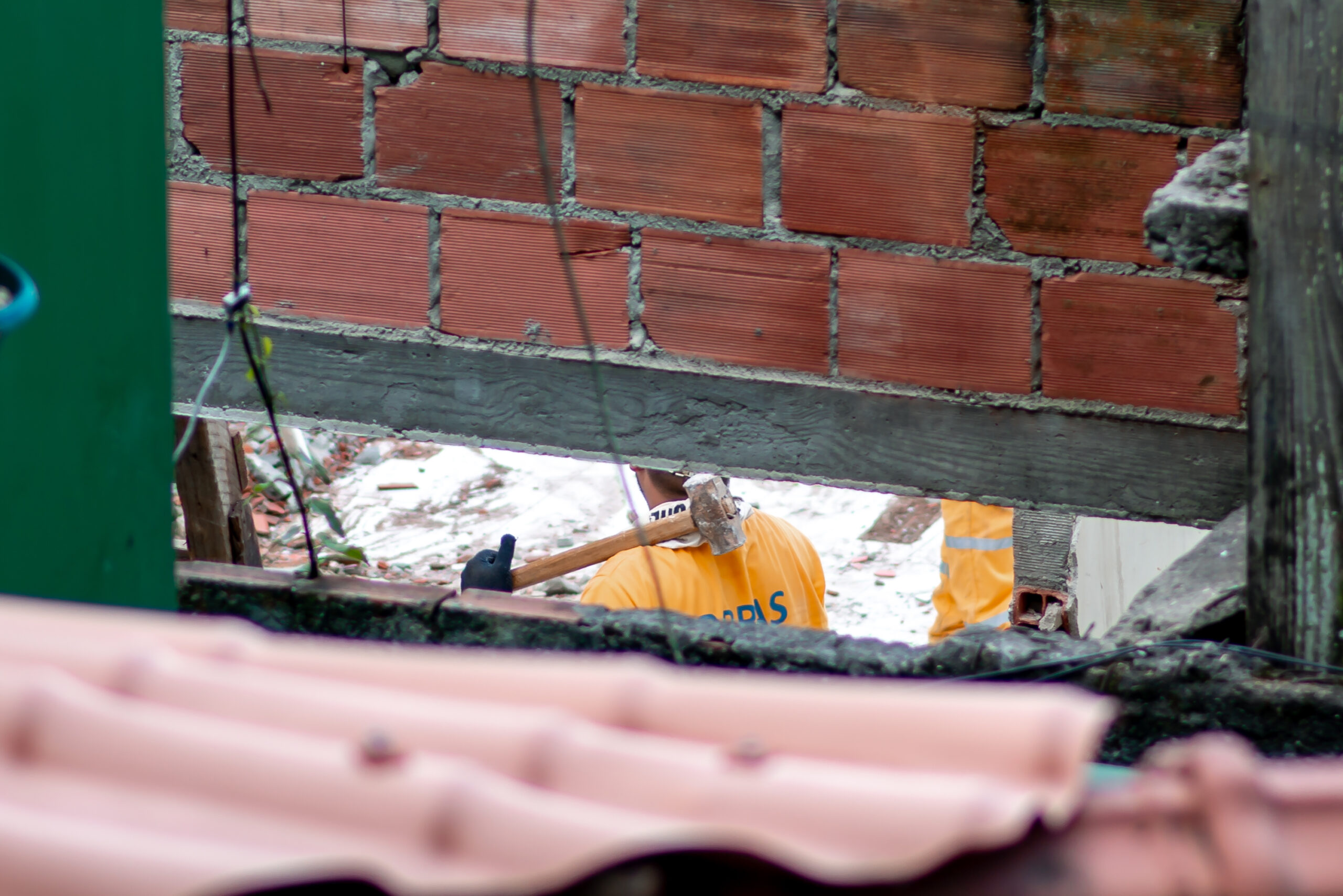
Last week, on August 16, residents of Jaqueira in the Vidigal favela in Rio de Janeiro’s South Zone experienced the removal of homes for the second time in four years. The first homes were destroyed by the City in 2019 following a landslide caused by heavy rains which affected the Jaqueira area and killed one resident. Since then, Jaqueira residents have lived in fear of evictions which affect entire families, life experiences, and collective memories.
Working with the Public Defenders’ Land and Housing Nucleus (NUTH), Jaqueira residents had succeeded in halting demolitions for a time and disputed the measurement of properties carried out by the Municipal Housing Secretariat (SMH). Residents also disagreed with the compensations offered for their homes: one house on the hillside overlooking Leblon and Ipanema beaches (some of the most valuable land in Brazil) was valued at a little over R$11,000 (US$2,300). Residents had wanted a containment project to be carried out on the hill slope so they could remain in the homes they had built over a lifetime.

However, the Rio de Janeiro Municipal Geotechnical Institute (GEO-RIO) deemed the location uninhabitable. According to GEO-RIO, Jaqueira is located in a thalweg, the middle of a channel where rainwater naturally flows. A draft plan for a containment barrier with a high-resistance spiral cable and adjustments to the drainage system was presented to the Vidigal Residents’ Association (AMVV) and those involved in the process. According to the document, even houses not located in the vicinity of the thalweg needed to be removed due to the potential impact on buildings resulting from the installation of cables on the rock surface. Residents disagreed with the proposal and filed a lawsuit, but lost the case.
No other document was produced to counter the city’s assessment, so four years after the landslide, many residents feared another tragedy and agreed to leave their homes. However, they hoped to receive fair compensation taking into account the value of their homes and how long they have lived in Jaqueira.
It is worth emphasizing that houses located in this part of the hill have breathtaking views of the beaches of Leblon and Ipanema. According to the Rio Housing Union, a square meter in Vidigal was valued at R$5,000 (US$1,000) to R$7,000 (US$1,400) in October 2022 . The DataZAP list published by Veja Rio magazine in June 2022 highlights Vidigal as having the 13th most expensive square meter of 2,304 neighborhoods in Brazil. Residents are unable to purchase houses in Vidigal equivalent to those they had in Jaqueira with the compensation offered.
“The amount was very low. We had people who received R$15,000 (US$3,000), R$20,000 (US$4,100). We have residents who are in debt, who used the amount they received in compensation as a downpayment and are paying for a house in installments, as if it were a rental unit.” — Custódio Silva*
At the hearing on March 23, 2023, Judge Luciana Losada Albuquerque Lopes ruled that homes would have to be vacated by May 3. According to those who attended the hearing, Rio Housing Secretary Patrick Corrêa stated there was enough money to compensate all residents and agreed to remeasure homes and adjust the previous compensation amounts as needed for each property. But this is not what happened.
There was an offer of assisted purchase, meaning the City would buy a property similar to the one the affected resident owned. However, for this to be possible, the City claimed such properties needed to have a title, which are rarely issued in favelas. Some families, in order to receive assisted purchase, had to move away from the place where they had emotional and identity ties.
At the hearing, the Housing Secretary also presented a proposal for the immediate payment of an additional R$20,000 (US$4,101) to those who would agree to leave, on top of any previous offer, but the amount continued to be seen by residents as absurd. Faced with the imminent deadline determined by the court for vacating demarcated houses, however, and afraid their homes would be demolished before they could find a safe place to live, many accepted.
“There was a lot of gossip, commotion… when they came here, city officials themselves said it was better to accept the amounts we were offered, otherwise we would end up with nothing. The whole process was very confusing, poorly executed, and without compassion. Personally, I never even got a notice. Suddenly, they took advantage of my open door—I wasn’t even home—and they went inside and took pictures, all without my permission. The narrative the whole time was: it’s better to take the offer because, otherwise, you run the risk of not getting a penny, or taking millennia to receive it. It was eviction and that’s that. People were scared, they’re simple people, not everyone knows their rights. They ended up taking it.” — Adalberto Pereira*

Guidelines set out by Rio de Janeiro City Hall for the demolition of buildings and relocating residents do not discriminate between neighborhoods; they are the same for the entire city. Differences in compensation values are determined by the type of building.
“Deep, deep inside… nobody agreed because the value paid for the houses was very low. But we had no alternative: we either took what we were offered or we filed an individual lawsuit, and these things are time consuming. How could families survive without compensation? We were practically forced to accept. We were in a bind because the court ruled [in favor of] eviction. When the second proposal came around [in March this year], the majority took the offer, which then weakened the fight. I think it would have been better if people had stuck together; [the compensation values] would probably have been higher.” — Maria Cruz*
At the last hearing, the judge ruled that houses would only be demolished following the presentation of a plan for Jaqueira. Demolitions started this month, but Vidigal residents still do not know what is planned for the area. The 2022 Civil Defense proposal envisaged reforesting the area, but there is no information as to whether there have been any changes.
There are also questions concerning the conduct of Patrick Corrêa. Current Rio Housing Secretary and specialist in institutional relations, Corrêa lived in Vidigal in the early 2000s and was a student at acclaimed local theater group Nós do Morro, responsible for producing actors that have gone on to perform in television and movies, including Oscar-nominated City of God. In order to negotiate with those affected by evictions, Corrêa approached the cultural organization he already had links with rather than the popularly-elected residents association, which is the only organization capable of legally representing the community.
According to the directors of Nós do Morro, Patrick Corrêa wanted to use a room at the theater group’s headquarters to negotiate compensation amounts with residents to be evicted. He offered paid positions to members of the institution to work with the Housing Secretariat (even to people who did not have training or experience in the area). Nós do Morro leaders were uncomfortable with the proposal and refused.
“How can someone who has lived here, who used Vidigal as a source of learning in their career, not have respect for the place, not engage in dialogue with its residents? He only showed up when the judge required it; he was just a representative of City Hall. I know that, in the end, they will use this as a platform. They will claim that they resettled us, compensated us, and everything went smoothly. Actually, it has been an exhausting, inhumane process.” — Adalberto Pereira

In the face of the inevitable eviction of residents from Jaqueira, due to the claim of high landslide risk presented in the Civil Defense report and subsequent legal defeat, there was no mobilization by the entirety of Vidigal to fight for residents to stay in the area, breaking with local tradition. Residents of Jaqueira felt left behind.
“If there really is a risk of landslides and rocks falling, we will sacrifice ourselves and leave our place to protect all of Vidigal. The whole favela should fight with us [however,] and demand the construction of an apartment building to resettle everyone. What they are offering is essentially nothing! Today it’s Jaqueira, tomorrow it’s another part of Vidigal. What I see is that there’s a generation coming up in the favela that is willing to lose the fight.” — Pedro Damião*
In a few days, Jaqueira as we know it will no longer exist. What remains is for us to demand that the site be reforested and that no other form of occupation is ever allowed. After all, neither poor nor rich are immune to the effects of rain and falling rocks.
“Each blow of the hammer is a bit of people’s dreams and life stories being destroyed.” — Custódio Silva*
*Pseudonyms have been used to protect resident identities.
View this post on Instagram
About the author: Bárbara Nascimento was born and raised in Vidigal. A Portuguese teacher in the Rio de Janeiro city and state public school systems, she holds an undergraduate degree in Modern Languages (from UFRJ in 2002) and a Master’s in Social Memory (from UNIRIO in 2019). She founded and directs the Vidigal Memories Nucleus, archiving and recording the collective memory of Vidigal.
